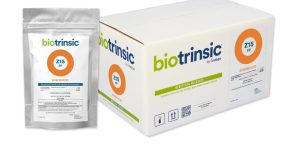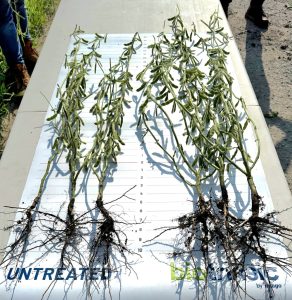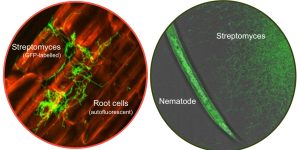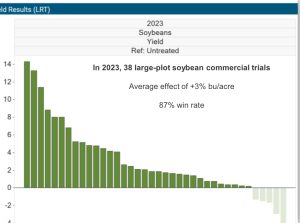
Indigo Ag’s biotrinsic® Z15 product, based on Streptomyces strain (SYM00257), is the first one of its kind to be registered as a bionematicide in the US market. This microbial endophyte works in roots of soybeans and corn to disrupt and defend against juvenile nematode infection and, later, to limit the reproductive cycle of parasitic nematodes throughout the growing season. biotrinsic® Z15 does so without impacting soil health or beneficial nematodes. As a living, plant-beneficial endophyte, Indigo’s biological product will not cause phytotoxic effects in plants, as is the case for some synthetic chemical treatments currently on the market. Its endophytic nature creates an expanding, living microbial zone in and around the root system, protecting against nematode attack and, through the production of geosmin, works to repel and limit the access of nematodes to roots.
Combining multiple defense mechanisms with improved root and vegetative growth, biotrinsic® Z15 improves crop yield performance
Plant-parasitic nematodes feed on the roots of plants, reducing their ability to absorb water and nutrients. Additionally, nematode damage increases the crop’s vulnerability to subsequent pathogen attack. Two of the most economically important plant parasitic nematodes in row crops are cyst and root knot nematodes.Soybean cyst nematode, Heterodera glycines, is found in every soybean production area in the United States, causing annual yield losses of up to 1.5B US dollars. Root knot nematode, Meloidogyne incognita, has been reported as one of the most prevalent species in both corn and soybean production areas, with yield losses estimated to be about ~450M US dollars. Nematode pressure is hard to predict because symptoms can be mistaken for other stresses occurring in the field and by the time a grower notices, the nematode numbers are often large, increasing difficulty to manage or control. Currently, nematode control is achieved by cultural, biocontrol, and chemical methods. Given continuing pathogen prevalence and yield losses, those methods are not yet sufficient, indicating a need for additional solutions for farmers. Indigo Ag set out to investigate the performance of soybeans and corn treated with a microbial strain that defends against plant parasitic nematodes.
Endophytes are microorganisms found in asymptomatic plant tissues which can help deal with a range of stressors including reduction of pathogen infection.
Methodology
Indigo Ag follows an integrated research and development process to advance microbes that work best in each region and crop of commercial interest. We start by sourcing our microbes from high stress agricultural areas relevant to our customers, then use genomics insights, laboratory, and greenhouse assay results to advance for field testing only those microbes showing consistent and statistically robust performance. From our field tests, we select microbes that outperform or are on par with commercial standards and register them as products. biotrinsic® Z15 is Indigo Ag’s first U.S EPA registered bionematicide under the claim of microbial seed treatment for the suppression of plant parasitic nematodes.
To determine nemastatic or nematicidal activity, we incubated Z15 in the presence of cyst and root knot juveniles and eggs in three independent trials. We then measured juvenile survival, egg survival, and egg hatching rate for both parasitic nematodes. Data was analyzed with a linear mixed effects model method, treatments were compared to formulation controls, and significance declared. To determine if Z15 is present in the plant after seed treatments, we conducted in planta soybean and corn colonization assays utilizing a GFP-expressing variant of the strain and visualized root tissue up to 4 weeks after planting.
A nematode juvenile root penetration assay was created to evaluate the number of juveniles infecting roots of soybeans treated or not with the microbial strain ten days after planting. Three independent trials were performed for both cyst and root knot nematodes. Data was analyzed with the same methodology used for the in vitro assays.
Soybean cyst field trials were run in a randomized complete block design at one location in 2019 with 12 replications, four locations in 2021 with six replications, and five locations in 2022 with five replications. Corn nematode trials were run in a randomized complete block design at two locations in 2021 with eight replications, four locations in 2022 with five replications, and five locations in 2023 with four replications. Locations were selected based on historical nematode pressure at those sites. Locally adapted, commercially relevant soybean and corn varieties were selected by the contract research organization at each location. Treatments were evaluated for above- and below-ground biomass and yield. Data was analyzed using a spatially adjusted Bayesian analysis framework across field trials.
Nematicidal or nemastatic effects
We observed mortality of root knot juveniles when incubated with biotrinsic® Z15 in one out of three trials but no effect was observed on cyst nematode juveniles in any of the trials. Under the conditions tested, no significant mortality or reduction in hatch rate was observed in cyst or root knot eggs when incubated with Z15 strain in three independent trials. These results indicate no direct antibiosis effects of the microbial endophyte on the nematode juveniles or eggs in the laboratory which may indicate that non-target beneficial nematodes in the soil that could encounter Z15 would not be directly affected by it.
From the in planta root juvenile penetration test, we observed a significant reduction in the number of cyst and root knot juveniles infecting soybean roots treated with Z15 compared to the formulation control in all three independent trials. Based on our in planta colonization assay, the presence of Z15 was confirmed in the roots of soybeans and corn four weeks after seed treatment and planting, indicating the microbial strain can colonize and inhabit the plant as an endophyte.
Nematode juvenile infection occurs as soon as roots start emerging into the soil and exudates from these are key compounds used by nematodes to find their hosts. Z15 produces geosmin, a terpene that deters nematodes in the soil. Therefore, we hypothesize that Z15 present in soybeans and corn roots deterred juvenile nematodes from finding roots and hence, less of these were able to infect the plants.
Soybean cyst nematode field trials:
In the 2019 trial, treatment with biotrinsic® Z15 improved root fresh weight and shoot fresh weight versus the non-treated control by +4.8% and +6.4%, respectively. Grain yield was unaffected by the microbial strain relative to the non-treated control. Trials run in 2021 and 2022 were analyzed together. In those years, the treatment with the microbial strain improved grain yield by +1.7%. When compared to fluopyram, a leading synthetic chemical product used by soybean growers to protect against nematodes, Z15-treated soybean had improved root weight (+3.3%) and shoot weight (+5.2%). In 2023, commercial trials at 38 locations indicated a high win rate in addition to improved yield.
Corn nematode field trials: Trials run in 2021 and 2022 were analyzed together. In that trial set, treatment with Z15 improved grain yield by 1.4%. In 2023 commercial trials, treatment with Z15 improved grain yield by 7.7%.
Biointristic® Z15 Innovation
Historically, microbial endophytes have not been widely commercially used as seed coating technologies in row crops. However, our field results in soybeans and corn are extremely encouraging since we observed grain yield improvements across locations, crop varieties, and agricultural practices. These results indicate that the endophytic nature of Z15 and its ability to deter nematodes are factors contributing to its robust efficacy across environments. By repelling parasitic nematodes without harming beneficial nematodes and promoting the growth and development of roots and above-ground, yield improvement is achieved.
About Indigo Ag
Indio Ag is the third winnersecond runner up of BioAg Pioneering Innovation Award 2024 presented in BioAgTech World Congress 2024 at Raleigh, North Carolina. Indigo Ag is a biotechnology Boston based company founded in 2013 whose mission is to harness the plant microbiome and to help farmers sustainably feed the planet. Indigo Ag has discovered and developed microbial endophyte products to help solve and complement current solutions against abiotic and biotic stressors in economically important row crops across the globe. biotrinsic® is a collection of over 36,000 naturally occurring microbial strains that have been extracted from plants thriving in stressful conditions. We isolate microbes that are abundant in plants that are thriving under stress while other plants around them are not. This allows us to produce products for a specific crop and set of stresses.






Leave a Reply